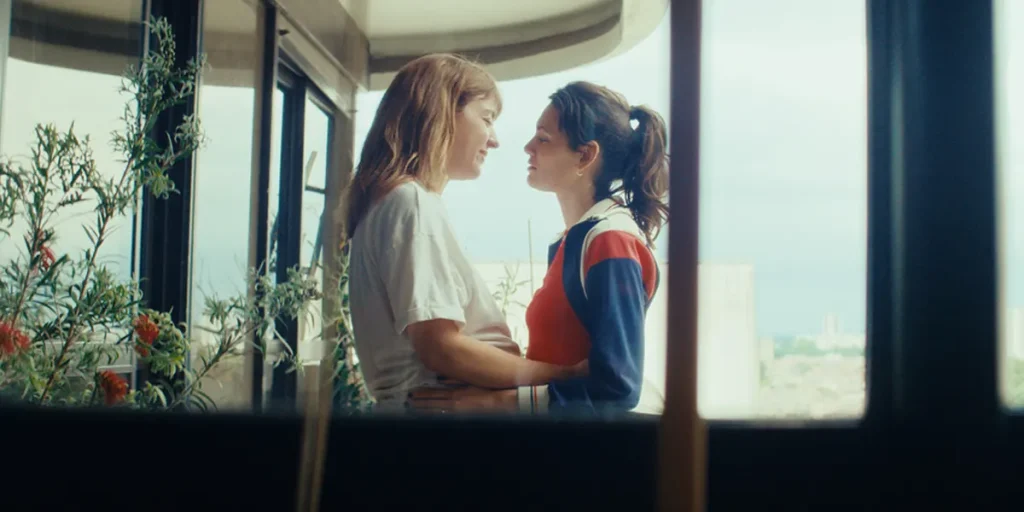Alice Douard’s Love Letters is a beautifully emotional story that portrays motherhood from various perspectives.
Director: Alice Douard
Genre: Drama, Comedy
Run Time: 97′
Cannes Premiere: May 17-22, 2025
Release Date: TBA
Alice Douard’s Love Letters (Des Preuves d’Amour), which premiered at Cannes’ Critics’ Week, is the director’s first feature film. Many movies have been made about motherhood. And yet the director manages to take a semi-overused topic and use it to tell a unique and emotional story.
Love Letters is set in Paris in Spring 2014, as the initial intertitles show during the opening scene. This is not just any date, but the moment when marriage for same sex couples was approved in France. This is key to the movie we are about to see, as, without the legalisation of gay marriages, the story of this film could have never happened. After getting married, Céline (Ella Rumpf) and her wife Nadia (Monia Chokri) can now have a child together, but it is a little bit more complicated than that, especially for Céline. As the latter is not carrying the child, she will have to fight a legal battle to adopt her own daughter after she is born. This involves testimonies, for which Céline will have to reach out to everyone around her, including her mother, a renowned pianist who the protagonist has a complicated relationship with.
From the very beginning, Love Letters does a really good job at integrating a personal story in the wider context of the fight for equality. Through their seemingly mundane interactions with their friends and family, Céline and Nia constantly remind us that the very story we are witnessing on screen could never have happened without the legalisation of gay marriage in France. While this is a massive victory, as one of the characters tells us of in the film, the movie also never fails to remind us of how many struggles this couple still has to face to have their own family, from being forced to do IVF in a different country to the very expensive and long legal battle Céline has to face, along with the many prejudices and assumptions people have about her life and her marriage.

The biggest strength of the film is its focus on the theme of motherhood. On the one hand, we see Céline and her strong desire to become a mother, through all adversities. This is mirrored by her partner Nadia, whose story explores a different but not so dissimilar relationship to becoming a mother, showing us how scary and terrifying it can be. On the other hand, the audience also sees Céline as a daughter and her complicated relationship with her own mother, a woman who seems to have chosen her career over her child over and over again, while also shining a light on the latter’s story. With these many points of view, Douard shows us a realistic and, at times, imperfect portrayal of motherhood.
The juxtaposition between Céline and her mother works especially well as they are constantly presented to us as two sides of the same coin. Both are mothers – or soon to be – and both are desperate to prove something to the other. Their respective careers also both involve music, but very different types of it, from Céline’s club music as a DJ to her mother’s classical interpretation of Beethoven. I also really liked how the film used the music and soundtrack as an integral part of its story. While it may feel somewhat random and inconclusive at the beginning, the soundtrack – and Beethoven’s pieces, more specifically – creates a connection and dialogue between mother and daughter that we can only find through music rather than words.
Sometimes it may feel like the movie is trying to do too much, by wanting to touch on multiple issues within the same topic but not necessarily having the scope – or runtime – to do so. I would have liked to see some of those themes explored more thoroughly, especially the economic aspect. Love Letters underlines more than once how expensive having a daughter is for the main couple, both in terms of doing IVF abroad and the legal procedure for Céline to adopt their daughter, but never fully explores this as a theme.
Love Letters is at its best when it focuses on the theme of motherhood in all its shapes and forms. Not only does this allow for a realistic portrayal of such a layered topic, but it also makes it especially exciting for the audience as they get to know, and perhaps even relate to, each character throughout the movie. It is also an incredibly promising first feature from a very exciting director I can’t wait to see more of, as she has proven she can masterfully use all elements of filmmaking to inform her story.
Love Letters (Des Preuves d’Amour): Movie Plot & Recap
Synopsis:
Céline is expecting a child with her wife Nadia. But while Nadia, the one who is pregnant, is automatically recognised as a parent to her daughter, Céline has to fight to become her child’s mother, which will only happen a few months – if not even a year – after her birth.
Pros:
- The theme of motherhood is explored very well as the film approaches it from multiple points of view.
- The personal story is very compelling, but also reflects on the wider context of the fight for equality for the LGBT community.
Cons:
- I wish the film had fleshed out certain elements of the couple’s adoption journey – for example, the economic side of it – more rather than just mentioning them.
Love Letters (Des Preuves d’Amour) premiered at the Cannes Film Festival on May 17, 2025, in the Semaine de la Critique. The film will be screened again at Miramar, Le Raimu, La Licorne, and Alexandre III on May 17-22.

